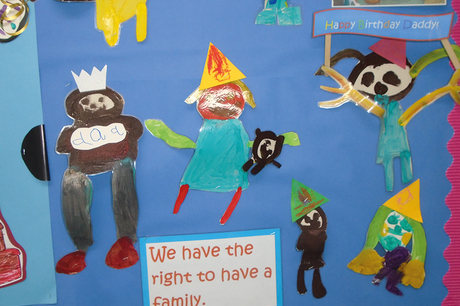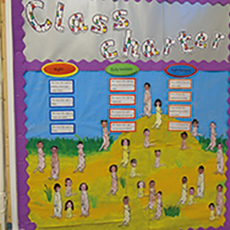
Despite having more than two years to grapple with what British Values are and how to promote them, many schools in England are still unclear about how to put the values into a meaningful context for young children.
Far from the Union Jack-waving image that British Values can conjure up, the Department for Education states that they relate to promoting ‘democracy, the rule of law, individual liberty, mutual respect and tolerance of those with different faiths and beliefs’. This makes the concept more understandable but still difficult to put into practice. As Zoe Harris, head teacher of Elmwood Infant School and Nursery in Croydon, says, ‘When British Values came up it was very wordy and not early years language. It seemed almost unreachable.’
However, at Elmwood – which serves a diverse community with more than 95 per cent of children from an ethnic group other than white British – they have successfully interpreted British Values for even the youngest children by working towards the Unicef Rights Respecting Schools Award (see box).
Integrating the United Nations Convention on the Rights of the Child into the ethos and working of the school enables children to experience them in action and so helps them to understand why it is important for everyone to have these rights.
‘For us, British Values is about respecting and celebrating everyone’s differences and uniqueness while understanding that we’re all part of the same community. The award is a good link to British Values because you can talk about the values but keep the language simple – such as the right to feel safe, right to an education, right to relax and play – so that it is meaningful for the children,’ says Ms Harris.
‘Being a Rights Respecting School gives us the extra support to really embed the features of a cohesive school, but all the staff have to buy into the concept, be consistent in it and use the right language.’

BRITISH VALUES
Democracy At Elmwood, children have their voices heard through the School Council, Rights Respecting Pupil Group and pupil questionnaires. For example, the Reception children identified their favourite outdoor learning activities to help staff plan new facilities.
EYFS and KS1 children complete an annual survey seeking their views on how involved they are with their learning, how happy and safe they feel at school, how well they are listened to and trusted to do things on their own. Responses are analysed to assess strengths, areas needing development and to plan ahead.
The rule of law Children all sign up to their ‘class charter’ outlining the rights and responsibilities of everyone within the class and around the school. ‘Even the nursery class has their own charter with simplified language, such as that staff have the duty to keep them safe and they have the right to use the toilet with privacy,’ says Ms Harris.
The importance of laws, those that govern the class, school or country, are reinforced through the school day. Pupils are taught the value and reasons behind laws, the responsibility this involves and the consequences when laws are broken.
Individual liberty Children are actively encouraged to make choices in the safe, supportive school environment. They are encouraged to know, understand and exercise their rights and personal freedoms, and advice is provided on how to exercise these safely; for example, by learning about online safety. 
During assemblies and circle time, staff and children discuss issues where groups of people may not have the individual liberty or safety that they have. ‘It’s easy to underestimate what children can achieve and understand, but children in Reception are able to talk about their rights and to express views and talk about not wanting their rights taken away,’ says Ms Harris.
‘From that they are able to talk about situations and circumstances where children have not got rights. Year 2 children watch Newsround, and being a Rights Respecting School has given us the values to talk about difficult subjects such as the atrocity in Paris. We could talk about how some people felt unsafe, that it was not right that some people were not acting responsibly and that they were not following the Rights of the Child.’
Mutual respect Rights Respecting School posters promote respect for others, which is reiterated through classroom and learning rules, as well as the behaviour policy. ‘It is not a behaviour management approach, but because it shifts attitudes and children start to talk about their right to an education, to feel safe and to concentrate, we can see a shift in behaviour and the children are more responsive to each other,’ says Ms Harris.
Each week, two children from each class are nominated for demonstrating positive behaviour linked to the values. They receive recognition in a ‘Golden Assembly’ and are invited to have tea with the head teacher.
Tolerance Assemblies and class discussions enhance pupils’ understanding of their place in a culturally diverse society, and the curriculum promotes positive images and tolerance of families of different faiths.
‘We are a harmonious community,’ says Ms Harris, ‘Children value each other’s differences and are interested in each other. They talk with respect, and you see this in the corridors and with their families. It is rare we have to talk about negative comments they have made around diversity.’
UNICEF AWARD
The Unicef UK Rights Respecting Schools Award supports schools to embed children’s human rights in their ethos and culture. It recognises achievement in putting the UN Convention on the Right of the Child at the heart of a school’s practice to improve well-being and help all children to realise their potential.
A Rights Respecting School is one where children’s rights are learned, practised, respected, protected and promoted. The award is based on principles of equality, dignity, respect, non-discrimination and participation.
CASE STUDY: JOHN BALL PRIMARY SCHOOL, LONDON
‘We’ve been a Rights Respecting School for six years and didn’t have to review policies or teaching when British Values was introduced because we already promoted them,’ says Rebecca Suffield, early years leader at John Ball Primary School in Blackheath, south London.
‘Giving children everyday experience of values, respecting others and celebrating difference helps build resilience and gets them ready for the world. But understanding that there are rules in society and consequences is challenging. It can take all year for early years children to develop a sense of other and genuinely empathise, so we work on this the whole time that they are in nursery and Reception.
‘Once children have settled in, we build a class charter together. We decide as a group how we should behave to ensure that we are all safe, happy, listened to and learn through play – being kind to each other, listening to friends and staff, taking turns and tidying up.
‘Nursery children learn about their rights discreetly through the language we use and staff modelling behaviour, like pushing in a chair or picking up scissors because we have the right to be safe. The language we use is of choice, such as we choose our behaviour and there are consequences. If we choose not to share, it can make people unhappy.
‘In Reception, we introduce rights through circle time and reinforce them during free-flow. We start by discussing what is a right by making the distinction between something we need to stay alive and something we want. A sorting activity can support this by sorting objects into what we need, such as water, and don’t need, such as toys. We discuss a different right each day. We may use books, such as Rainbow Fish and Mr Big, to understand the right to be happy or act out scenarios and think about how that person should have behaved to build up a picture of what it means to be safe.
‘After Christmas we look at the idea of trying to become more independent by not always going to an adult but talking to a friend and negotiating. If a whole-class decision is needed, we have a vote. Children can see that it is fair as the decision is based on what the most children want, but they learn that they won’t always get their way. We see children adopting this in their play when choosing games.
‘We have a wide mix of cultures and beliefs represented among the children and are able to celebrate differences through our families. We seek out parents from different religions to speak to the children so we can base discussion on real situations. Children are excited to be the expert and tell their friends about their religion. They learn we all have the freedom to choose our religion as long as we are kind and respectful.
‘They are difficult concepts, but children gradually buy into them. Getting it right in the early years means that Rights Respecting filters through the school.’
MORE INFORMATION
- www.gov.uk/government/news/guidance-on-promoting-british-values-in-schools-published
- www.unicef.org.uk/rights-respecting-schools/about-the-award
- www.johnball.lewisham.sch.uk
- Sargent M (2016) Promoting Fundamental British Values in the Early Years. Practical Pre-School Books









